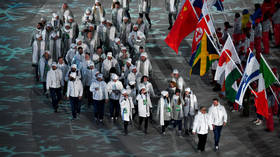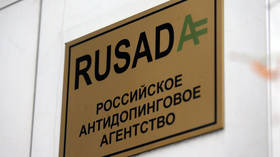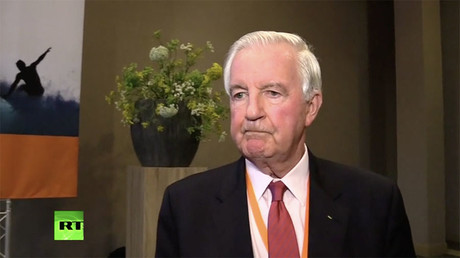Geopolitics before sport: Russian athletes were punished for being Russian
Neil Clark is a journalist, writer, broadcaster and blogger. He has written for many newspapers and magazines in the UK and other countries including The Guardian, Morning Star, Daily and Sunday Express, Mail on Sunday, Daily Mail, Daily Telegraph, New Statesman, The Spectator, The Week, and The American Conservative. He is a regular pundit on RT and has also appeared on BBC TV and radio, Sky News, Press TV and the Voice of Russia. He is the co-founder of the Campaign For Public Ownership @PublicOwnership. His award winning blog can be found at www.neilclark66.blogspot.com. He tweets on politics and world affairs @NeilClark66
Published time: 23 Jan, 2019 14:12

Russian athletes, falsely accused of doping, won an important legal victory at the weekend. But unfortunately, the mud has stuck which is what Russia's geopolitical enemies always wanted.
As the old saying goes "a lie can be halfway around the world before the truth has got its boots on." Basically on the 'evidence' of one man, who lives in America, and the lobbying of certain NATO countries, Russian athletes were collectively held to be guilty of doping offences and deprived of their opportunity to compete at the very highest level.
A great injustice was done to the sportsmen and women involved, but now, finally, the record is being put straight.
On Saturday, the Swiss Supreme Court turned down the International Olympic Committee's appeal against the Court of Arbitration for Sport's ruling to acquit 28 members of Team Russia of doping allegations during the 2014 Sochi Winter Olympics.
ALSO ON RT.COMIOC knew Russian athletes were clean, but concealed evidence of their innocence – lawyer
Christof Wieschemann, the lawyer for Russian cross-country skier Alexander Legkov, who the IOC tried to deprive of Olympic medals, has stated that Russian athletes falsely accused could have avoided career-ruining bans if the IOC hadn't concealed facts of their innocence.
His firm says that the IOC "seriously violated the procedural rights of the athletes and even withheld exculpatory evidence from the defense and the court."
Wieschemann says he filed no fewer than five written requests to the IOC for evidence against his client, but he was never shown any.
READ MORE: 'Unsportsmanlike behavior' Russian officials react as IOC's appeal against Legkov overturned by CAS
Just imagine if US athletes had been treated in such a scandalous way. But it's Russians and of course we all know they're a bunch of cheats, don't we? That's certainly what we are supposed to believe by those who want us to hate Russia as much as they do.
The campaign to get Russian athletes banned can be traced back directly to those countries who are most vocal in opposing Russia internationally. This is about politics and not genuine concern about sporting malpractice.
In July 2016, Reuters revealed how the heads of US and Canada's anti-doping bodies had drafted a letter to WADA, the World Anti-Doping Agency, calling for ALL Russian athletes to be banned from the Rio Olympic Games. The letter was circulated by the Canadian representative to other WADA members.
As I wrote here, just imagine if the Russian anti-doping agency had sought to get all US or Canada athletes banned, whether or not they had been found guilty of cheating.
The WADA report into alleged Russian 'state-sponsored' doping, based solely on the testimony of former Moscow anti-doping laboratory director Grigory Rodchenkov, who defected to the US in 2015, was put together by a Canadian lawyer, Richard McLaren.
No one is saying that McLaren was himself biased, but surely in the interests of natural justice, would it not have been better if the report had been compiled by someone from a non-NATO country and not a country that was, quite clearly, pushing for a Russian ban?
Even Russian Paralympians have been victimized. In 2016, the International Paralympic Committee (IPC) bowed to pressure to introduce a blanket ban on Russian Paralympians competing in Rio. Six of the 14 members of the IPC's governing board came from NATO countries.
The IOC itself came under enormous pressure to introduce a similar blanket ban on Team Russia competing in the 2018 Winter Olympics in PyeongChang. We know from leaks from the hacktivist group Fancy Bear, that the IOC was far from satisfied with the 'proof' of a state-sponsored program in parts of the McLaren report. We also know that Martial Saugy, the former director of the WADA's accredited doping Laboratory of Lausanne accused the McLaren report of making "incorrect allegations."
In November 2017, WADA chief Craig Reedie admitted that, while there were "hints" and "claims" of evidence of a systematic state-sponsored Russian doping scheme, 95 of the 96 cases of Russian athletes WADA was investigating had been suspended because "there was not sufficient evidence to pursue an anti-doping rule violation."
In normal times, the IOC would have acknowledged that the case against Russia did not stack up. But these were not normal times.
Portraying Russia as a country that cheated, on a routine, state-sanctioned level at sport has been an important part of the propaganda campaign to delegitimize the country and place it in the international 'sin-bin.' This would be punishment for Russia for daring to thwart neocon plans for regime change in Syria and for being a competitor with the US in the lucrative European energy markets. Russia can't be trusted. It needs to be sanctioned. Don't you get the message?
It was entirely predictable that the IOC's decision to ban Russian athletes from competing under the Russian flag in PyeongChang, was lauded on social media by the late US neocon Senator John McCain. He also used it an opportunity to call, once again, for FIFA to take the 2018 Football World Cup away from Russia.
An American playwright called Bryan Fogel, also did his bit. As I noted here, it was Fogel and Rodchenkov who took their story to the New York Times, triggering the McLaren report.
'Icarus', the documentary film Fogel made, which included interviews with Rodchenkov, not surprisingly given the neo-con induced Russophobic climate, won an Academy Award in 2018.
In an interview with the FT, Fogel said Russia had a "cultural problem" with drugs, which went back to communism.
Let's not mention how communist Hungary were cheated out of the 1954 World Cup, or the allegations about widespread US doping made by Wade Exum, the US Olympic Committee's former director of drug control, in 2003, shall we?
I took a look at Fogel's Twitter feed and guess what? The first tweet is a retweet of Kremlin critic Bill Browder. Fogel also refers to WADA chief Sir Craig Reedie – who spoke to RT in 2017 – as a "criminal President."
You can see where he's coming from.
Saturday's Swiss court decision comes too late for the innocent Russian athletes who lost their chance to compete under the flag of their own country at the greatest sporting events in the world.
But it should, I think, inspire a new report and then a new investigative documentary on the campaign to get Russia banned. It could be called 'Robbed!'. Only this time, don't expect it to win an Oscar.
Follow Neil Clark @NeilClark66
Like this story? Share it with a friend!
The statements, views and opinions expressed in this column are solely those of the author and do not necessarily represent those of RT.



0 Comments:
Post a Comment
Subscribe to Post Comments [Atom]
<< Home